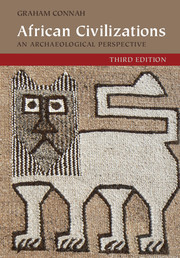Book contents
- Frontmatter
- Dedication
- Contents
- List of figures
- Preface and acknowledgements
- 1 The context
- 2 Origins: social change on the lower Nile
- 3 The Mediterranean frontier: North Africa
- 4 Sudanic genesis: Nubia
- 5 Isolation: the Ethiopian and Eritrean Highlands
- 6 Opportunity and constraint: the West African savanna
- 7 Achieving power: the West African forest and its fringes
- 8 Indian Ocean networks: the East African coast and islands
- 9 Cattle, ivory, and gold: social complexity in Zambezia
- 10 Central Africa: the Upemba Depression, Interlacustrine Region, and Far West
- 11 Settlement growth and emerging polities: South Africa
- 12 What are the common denominators?
- References
- Index
1 - The context
Published online by Cambridge University Press: 05 November 2015
- Frontmatter
- Dedication
- Contents
- List of figures
- Preface and acknowledgements
- 1 The context
- 2 Origins: social change on the lower Nile
- 3 The Mediterranean frontier: North Africa
- 4 Sudanic genesis: Nubia
- 5 Isolation: the Ethiopian and Eritrean Highlands
- 6 Opportunity and constraint: the West African savanna
- 7 Achieving power: the West African forest and its fringes
- 8 Indian Ocean networks: the East African coast and islands
- 9 Cattle, ivory, and gold: social complexity in Zambezia
- 10 Central Africa: the Upemba Depression, Interlacustrine Region, and Far West
- 11 Settlement growth and emerging polities: South Africa
- 12 What are the common denominators?
- References
- Index
Summary
Africa is huge; it is so big that you can put the United States and Australia into it and still have a bit left over. It extends from about 37° north to about 35° south and has an altitudinal range from depressions that are below sea level to mountain peaks that exceed 5,000 metres. As a result it has an incredible diversity of environments. It contains some of the driest deserts in the world, and yet has three of the world's major rivers: the Nile, the Niger, and the Congo. Some of the hottest places on earth are in Africa, and yet there are glaciers on its highest mountains. There are steaming rainforests and dry savanna grasslands, low-lying river valleys and high plateaux, extensive deserts and gigantic lakes, mangrove coasts and surf-pounded beaches. This is only an impressionistic picture of the very large number of differing environments in the African continent. In reality the major zones merge into one another, resulting in an even greater variety of conditions that have been further complicated by climatic variation through time.
For at least 2 million years, human beings have been learning how to get the best out of the kaleidoscope of African environments. Those environments have not determined what men and women could do, nor could the latter ignore the environments in which they have lived. Instead there has been a dynamic relationship between the two, in which people have sought to turn to their advantage the opportunities offered by each environment and to come to terms with its constraints. First as hunters, gatherers, and fishers who gradually intensified their exploitation of available resources, then as pastoralists and cultivators, and eventually as city-dwellers, artisans, and traders, men and women have continued to interact with their environment, retaining a remarkable variety of strategies for doing so.
Archaeology is a major source of information about Africa's past. Documentary sources for African history are limited: their coverage often chronologically patchy and geographically fragmented. For large areas of Africa, particularly tropical Africa, their time depth is restricted to the last century or two.
- Type
- Chapter
- Information
- African CivilizationsAn Archaeological Perspective, pp. 1 - 16Publisher: Cambridge University PressPrint publication year: 2015



